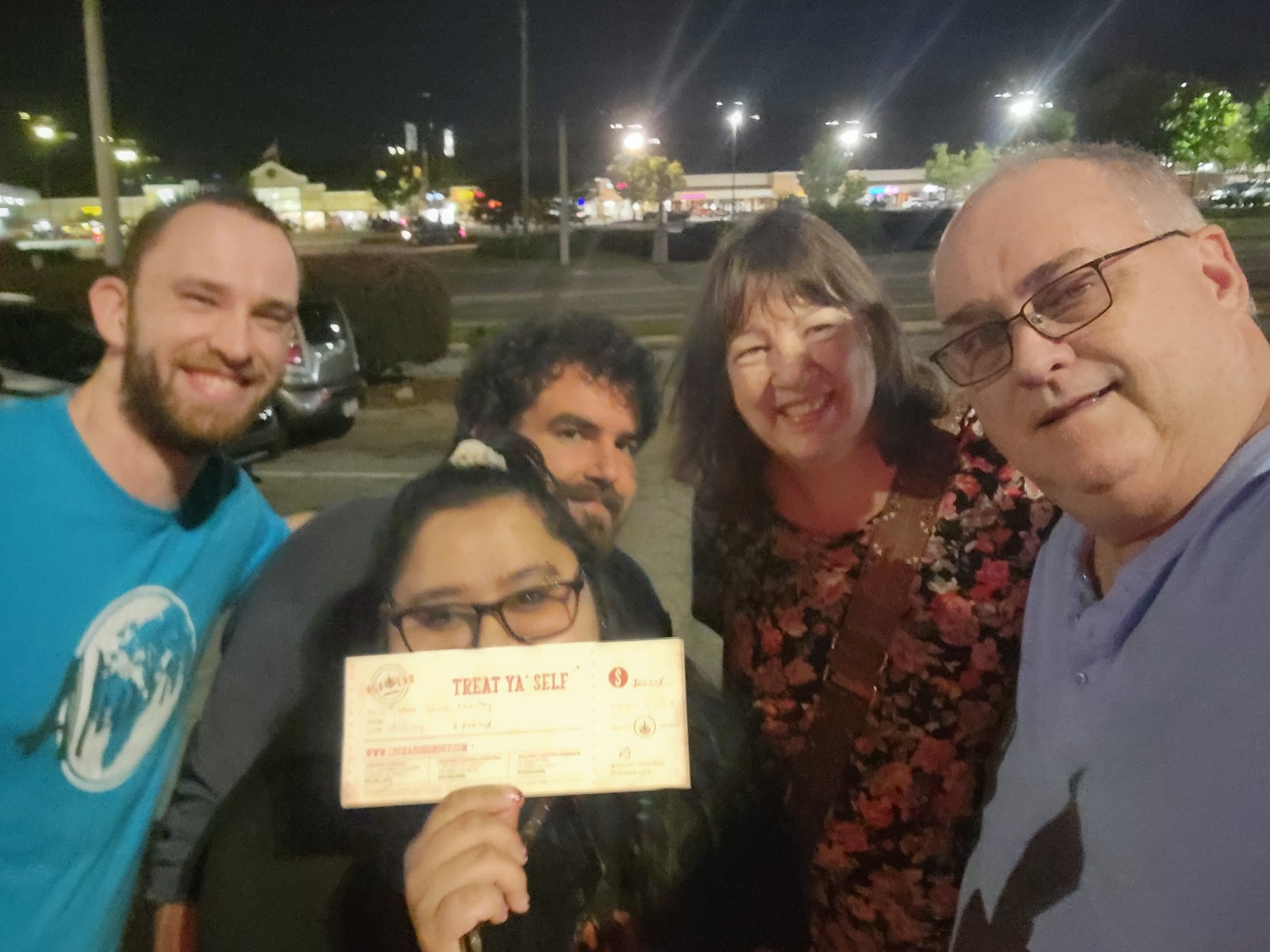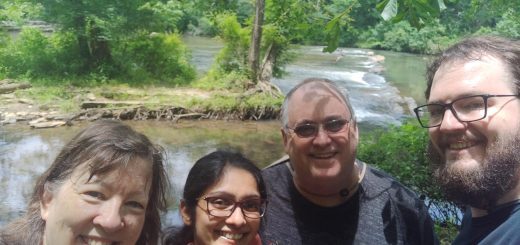And Now, God, Do It Again!

“And now, God, do it again!” – September 22nd, 2024 (Psalm 126)
The good old days
When my sister and I get to sharing stories from the past, one of us invariably says, “Those were the days!” to which the other replies obligingly, “Those were not the days!” Certainly, we all have positive and negative memories. But I have to confess that sometimes a part of me longs for the “good old days.”
When I was 8, my outdoor cubby hole, as we called it in Australia, was a sheltered area nestled beside our back fence. Branches from a neighbor’s tree hung over the fence, such that I could lie back in soft and shady comfort, reach up, and pick some fruit fresh off the tree. They were the sweetest plums I’ve ever tasted and have been searching for ever since.
When Paul and I were in our 20s, the Spirit of God ignited our church such that it grew from about 50 to 1500 within just a couple of years. Many passionate young people gathered together on Sundays, in small groups, and on outreaches and missions.
For many years when our children were very young, even though Paul and I fell into bed exhausted each night, we set up our family life to include time each day to sing together, dance together, explore together, read together, and spend most of our waking hours together. Little ones were welcome to climb into bed with us during the night for reassuring cuddles. Love, peace, and joy abounded!
“Good old days” is a popular cliché used to reference a time considered by the speaker to be better than the current era. It’s often accompanied by feelings of nostalgia, homesickness, or yearning. I like to say that if we’d known how good we had it, we would have been more grateful, and we would have paid more attention! Daniel Defoe, best known for his novel Robinson Crusoe, described almost 300 years ago how the “good old days” tradesmen were better off than in his own time. My seminary preaching professor named Twenty One Pilot’s 2015 song Stressed Out, with its emphasis on self-doubt and anxiety, as the theme song of a generation: “Wish we could turn back time to the good old days when our mama sang us to sleep, but now we’re stressed out.”
There is actually a centuries-old technical term for this rosy retrospection: “declinism,” the predisposition to view the past more favorably and the future more negatively. British columnist Jemima Lewis describes it as “a trick of the mind” and “an emotional strategy, something comforting to snuggle up to when the present day seems intolerably bleak.”
Imagine with me what might happen if I tried to live in any of my “good old days” stories.
- Remaining in the search for the ideal plum would entail wasting a lot of time and energy searching for one specific fruit while missing the blessings of myriads of other delicious and seasonal fruits. Also, taste buds change! The Cleveland Clinic tells us, “Basal cells develop into new taste receptor cells every 10 days. Our perception of taste changes at different stages of life. The flavors we enjoy as adults may differ from those we savored as children.” Letting go of the “good old days” of the sweetest plums allows me to appreciate and discover many other delicious and nutritious foods!
- If I defined my success as a pastor or the health of our church primarily by numerical measurements, I would be tempted to view people as data assets instead of as infinitely valued and beloved children of God. I would be tempted to focus on surefire church growth principles to increase membership and giving. I would also likely become more judgmental of other churches or ministries based on cold statistical analysis. I would be tempted to take on the doubts and anxieties of others who erroneously define success or health in these ways. (Side note: I wish this were a hypothetical situation, but it is sadly very common!) Letting go of the “good old days” of whatever supposedly ideal church I’ve experienced or heard about allows me to engage in the slow process of cultivating authentic and interdependent community here and now at Liberty Vineyard, as we practice self-giving love towards God and one another. I’ve had hundreds of conversations with people during my first year serving as your pastor, and I never get tired of telling people how much I love getting to do this and that I am so proud of each and every one of you!
- If we had tried to hang on to the exact ways in which we as parents related to our young children, our relationships would have become increasingly codependent and even toxic as they grew towards adulthood and beyond. All adults continue to need support and encouragement, but of course the ways in which this is offered and shown will not be the same as in childhood. Interdependence is an important goal for healthy relationships, and not letting go of adult kids can actually be very harmful. Parents of adults who use guilt, fear, shame, or manipulation are known as interfering or even overbearing. Churches who use guilt, fear, shame, or manipulation are known as toxic or even cultlike. Family life educator, social worker, and licensed mental health professional Joannie DeBrito, names adaptability as the key trait that we need to develop in any ongoing close relationships because “life just continues to get more complicated.” Letting go of my template of what any particular relationship ought to look like allows me to grow towards much healthier relationships characterized by open communication, curiosity, time, trust, participation, and playfulness.
What about you? You might have some “good old days” longings of your own, whether things you’ve experienced or things you’ve read or heard about. The “good old days” may well have been good at the time. But living things only thrive when accompanied by growth and change. To try to think or to live as we did in the “good old days” is to put artificial limits around what we’re willing to do in our life with God. It’s the wrong goal to try to keep things as they were or to try to go back to something in the past. God is calling us ever onward. 1 Corinthians 2:9 (The Message) – “No one’s ever seen or heard anything like this, never so much as imagined anything quite like it – what God has arranged for those who love him.”
Before we read Psalm 126, let’s consider what was going on at the time this was written, the early postexilic period after the Jewish exiles had returned from captivity in Babylon. Their initial joy soon faded because life was so hard for those who returned. In the Ancient Near East, the walls and gates of a city were absolutely essential to the peace and safety and wellbeing of the inhabitants. Without that security, they were in constant danger and distress. The walls and gates of Jerusalem had been broken down or destroyed. They had hoped that their return to Jerusalem would be a return to the “good old days,” but that had not happened. Theologian and Old Testament Professor, Daniel J. Estes, describes this period as “a time of discouragement, when the people of Judah wondered if their past joy would ever return … in general terms, it was a trough between joys experienced in the past and hoped-for joys in the future.”
The restoration has begun (v. 1-3)
Psalm 126:1-3 – “1 When the Lord restored the fortunes of Zion, we were like those who dream. 2 Then our mouth was filled with laughter, and our tongue with shouts of joy; then it was said among the nations, ‘The Lord has done great things for them.’ 3 The Lord has done great things for us, and we rejoiced.”
The overall tone in this first half of Psalm 126 is gratitude and thankfulness to God for his praiseworthy intervention in the past: the restoration has begun. Let’s look at these three verses in detail.
In verse one, the original Hebrew for “restored the fortunes” is literally “turn a turning [to a present condition].” And the phrase, “when the Lord restored the fortunes of Zion” is literally “when Yahweh re-turned the re-turn of Zion.” God created humans to thrive with him in the Garden of Eden, a place of flourishing, wholeness, delight, and blessing. The psalm’s reference to Zion indicates the place of blessing where God’s power and presence are located. But, as Isaiah 53:6 tells us, “All we like sheep have gone astray; we have all turned to our own way.” This turning to our own way means that we all turn away from God’s highest and best. So this re-turning the re-turn of Zion is the Psalmist’s way of saying, “the restoration has begun!” The restoration has begun! God has started putting things back to the way they were supposed to be. It made the people describe themselves “like those who dreamed.” I think that because of what we’ve all been through in recent years, we’re going to need some help understanding what this analogy meant in the 1st century. Just one month into the pandemic, one blogger commented, “The coronavirus has been the nightmare that we all can’t seem to wake up from and one of many realities I wish I could run from.” Viennese researchers stated in a 2022 paper, Dreams and Nightmares during the Pandemic, that 26% of people reported experiencing more nightmares just a couple of months into the pandemic. But those are not the kind of dreams the psalmist is talking about here. According to Hossfeld and Zenger, in their commentary on the Psalms, two aspects of dreams are intended. Firstly, when Yahweh “began to turn back to Zion, it was like an unexpected, wonderfully beautiful dream whose fulfillment those who dream did not doubt.” Secondly, the return and restoration were their reality, but “it was as unexpected and God-sent as a dream whose full achievement, though in progress, was still in the future.” It was a dream come true; it marked a sharp reversal of the harsh reality of their former distress.
Verse two starts with and includes a second mention of a tiny word az. Various English versions opt to translate this as “then” or “and” or omit it altogether. It reminds me of a breathless child trying to convey something really important as quickly as possible. “And then, and then …” (breathing) “And then that’s what happened!” “And then, and then …” (more breathing) You get the idea. This restoration is a breathless wonder! Breathless, perhaps, because their mouths were filled with peals of laughter! When is the last time you gave yourself permission to laugh like that? Life is hard! Peals of laughter are like relief valves that release the excess pressure in a steam engine to prevent the boiler from exploding. Psalm 126 blesses us to let our thankfulness take over sometimes, to laugh loud and long without limit! And then their peals of laughter gave way to shouts of joy! What are shouts of joy, anyway? Let’s try some!
- Bravo!
- Wow!
- Yay!
- Hooray!
- Huzzah!
- Ahhhhhhhh!
- Whee!
- Yippee!
As we look at one last aspect of this first half of the Psalm, imagine how the original hearers or readers or singers of this Psalm would have understood the next phrase, “it was said among the nations.” Word of mouth news does spread, but it spreads pretty slowly. Today, 99.2% of the entire population of the world has a cell phone. We’re at the point in history where we realize that something can be “said among the nations” in the time it takes us to say, “I learned it on TikTok today.” Of course, unlike TikTok, everything the Psalmist tells us was said among the nations was entirely accurate and admirable: “The Lord has done great things for them. The Lord has done great things for us, and we rejoiced.” This is not merely an emotional state; the people began actively celebrating in God’s presence.
The restoration is to come (v. 4-6)
As we read the second half of Psalm 126, notice how similar the first few words are to the beginning of the Psalm.
Psalm 126:4-6 – “4 Restore our fortunes, O Lord, like the watercourses in the Negeb. 5 May those who sow in tears reap with shouts of joy. 6 Those who go out weeping, bearing the seed for sowing, shall come home with shouts of joy, carrying their sheaves.”
The difference between the beginning of the first and second half of Psalm 126 is that in this second section the focus is changed from a demonstration of God’s power before the world of the nations (in the past) to God’s power and presence as something that God desired the community to experience in everyday life (now and in the future)!
This restoral of fortunes is compared to the watercourses in the Negeb, a desert and semidesert region of southern Israel. The Hebrew word negeb means “south country,” from the Hebrew root denoting “dry.” The original hearers and readers of Psalm 126 understood this reference very well. In summer, streams in the Negeb failed and dried up. But in winter, after the rains came, suddenly the streams were full again. Just as watercourses signal the end of drought in the desert, reviving the land and making it fertile, so God’s restoration revives his precious image-bearers and enables us to thrive! This reversal of fortunes transformation can happen at any time in ways that will be surprising, astounding, and wonderful.
God promises that where there have been tears, there will be joy. Where there has been weeping, there will be shouts of joy and a bountiful harvest. This is not a simplistic “sunshine always follows the rain” statement. Where life seems dry and discouraging, God invites us to find joy as we count the Lord’s past blessings, keep faithful in the present, and claim God’s future promises. The Psalmist encourages all who hear to put our trust in God, the creator and sustainer of all life, who is good and does good. No matter how troubled the times, no matter how sad the situation, we can rest in the certainty that God is faithful: God always hastens to restore people and purposes, hears and responds to our prayers, and heals and refreshes us to experience wholeness, flourishing, and delight.
Isaiah 51:3 (NRSV) describes this vision of restoration – “For the Lord will comfort Zion; he will comfort all her waste places, and will make her wilderness like Eden, her desert like the garden of the Lord; joy and gladness will be found in her, thanksgiving and the voice of song.”
The present distresses we face are no argument for denying God’s power or grace. If God did it then, God can do it now. Psalm 77:5-11 (NRSV) urges us to remember God’s goodness: “5 I consider the days of old, and remember the years of long ago. 6 I commune with my heart in the night; I meditate and search my spirit: 7 Will the Lord spurn forever, and never again be favorable? 8 Has his steadfast love ceased forever? Are his promises at an end for all time? 9 Has God forgotten to be gracious? Has he in anger shut up his compassion? … It is my grief that the right hand of the Most High has changed. 11 I will call to mind the deeds of the Lord; I will remember your wonders of old.”
Psalm 77 is almost a template for what to do when we’re in great distress:
- Consider what God has done in the past
- Be present and honest with yourself
- Ask God the hard questions
- Remember what God has done in the past
- Repeat
I’m a big fan of continually feeding my mind with stories of what God has done, in Scripture, in church history, in other times and places. This is the very reason we do “Testimony Sunday” here at Liberty Vineyard. It’s not just a nice idea to hear stories of what God has done. We need to consider and remember what God has done – if God did it there and then, God could do it here and now! As we consider and remember how God has reversed the fortunes in other times and places, our faith and hope are strengthened that God can be relied upon to reverse our painful present, by sending rain of blessing and giving us an abundant and welcome harvest.
Jesus assured all who follow him, in John 16:22 (NRSV): “you have pain now; but I will see you again, and your hearts will rejoice, and no one will take your joy from you.” God promises us not the “good old days” but everlasting joy!
The restoration of the kingdom of God
Psalm 126 points us to the restoration that has begun and the restoration that is to come. If that sounds kinda familiar, it’s likely because that is exactly how we understand Jesus’ description of the kingdom of God here at the Vineyard – it is already-but-not-yet-fully here.
Vineyard theologian, pastor, and teacher, Derek Morphew, explains it in in these thrilling excerpts from his website, https://kingdomtheology.net/:
“The world into which Jesus came preaching the kingdom had expectations … A day would come when God would again intervene for Israel, in a final, overwhelming moment … which would terminate history as we know it and begin life at a totally new level in the messianic age, or the age to come …The prophets spoke of the Day of the Lord, the last days, or that day.
Jesus came announcing that such a day had dawned with his arrival. Yet the way he announced and taught the kingdom had a sense of mystery. He spoke of it as being ‘near,’ ‘present,’ ‘delayed,’ and ‘future.’
… Something mysterious, unexpected … and miraculous occurred in Jesus and in the outpouring of the Spirit at Pentecost. The power of the future age broke through, from the future, into the present … The mysterious breakthrough of the kingdom was particularly manifest in the ministry of Jesus as he announced it, taught about it, and demonstrated it and in the cross, resurrection and ascension, and the outpouring of Pentecost …
Between the coming of the kingdom in Jesus and the final coming of the kingdom in Jesus is the time we now live in as Christians, and as the church in the world. Around us is a world that lives … in this present age, while we experience Jesus and the life in the Spirit in a new dimension, the life of the coming age or eternal life lived now.”
And now, God, do it again!
Let’s close by reading Psalm 126 in The Message translation: “1 It seemed like a dream, too good to be true, when God returned Zion’s exiles. 2 We laughed, we sang, we couldn’t believe our good fortune. We were the talk of the nations – ‘God was wonderful to them!’ 3 God was wonderful to us; we are one happy people. 4 And now, God, do it again – bring rains to our drought-stricken lives 5 so those who planted their crops in despair will shout hurrahs at the harvest, 6 so those who went off with heavy hearts will come home laughing, with armloads of blessing.”
As we pray, “And now, God, do it again,” we’re not asking God to take us back to the “good old days.” We’re not asking God to do the exact same thing in the exact same way as he did something in the past. Consider Jesus, who, when he asked Father God to remove the cup of sorrow and suffering from him as he prayed on the Mount of Olives, emphasized, “But please, not what I want. What do you want?” (Luke 22:42). To pray, “And now, God, do it again” is to ask God to do God’s purpose and God’s will. We’re asking God to be wonderful to us as he has been wonderful to us and to others in the past. Letting God be God means that we let go of our hopes and expectations for particular outcomes. To follow Jesus is to follow the way of self-giving love, which is to lay down our own preferences and hopes and dreams and expectations and desires. God calls us to the way of love, which as Thomas Aquinas tells us is “to will the good of the other.”
Let us each consider areas of our lives where we realize we have been longing for the “good old days.” May we surrender those afresh to the Lord and pray, “And now, God, do it again … But please, not what we want, not what I want. What do you want?”




